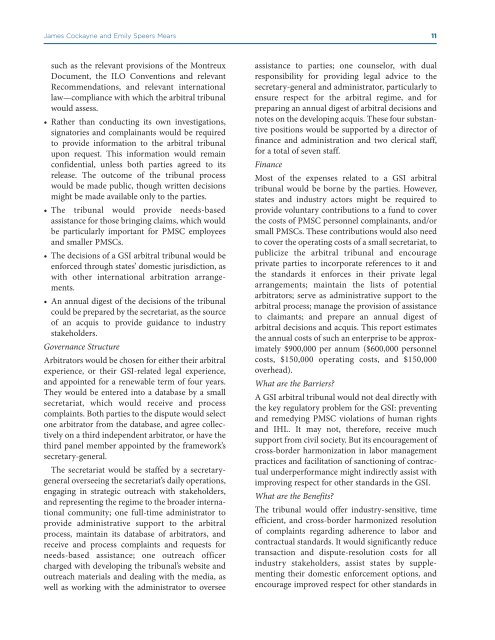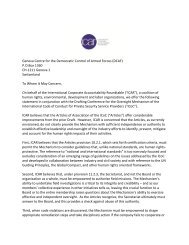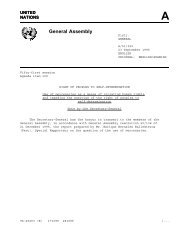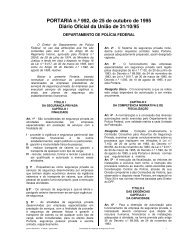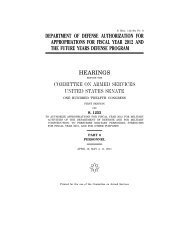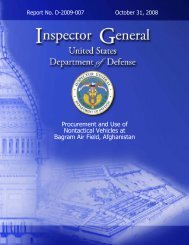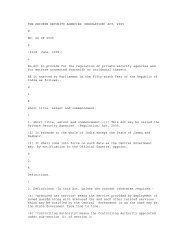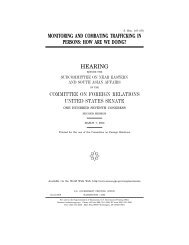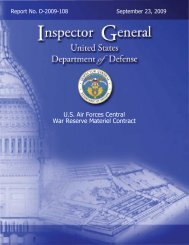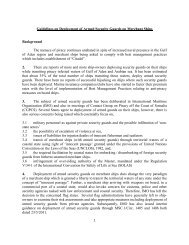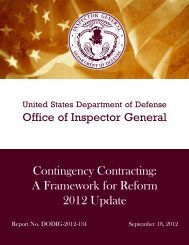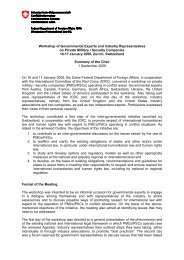A Framework for Regulation - Private Security Monitor
A Framework for Regulation - Private Security Monitor
A Framework for Regulation - Private Security Monitor
- No tags were found...
You also want an ePaper? Increase the reach of your titles
YUMPU automatically turns print PDFs into web optimized ePapers that Google loves.
James Cockayne and Emily Speers Mears 11such as the relevant provisions of the MontreuxDocument, the ILO Conventions and relevantRecommendations, and relevant internationallaw—compliance with which the arbitral tribunalwould assess.• Rather than conducting its own investigations,signatories and complainants would be requiredto provide in<strong>for</strong>mation to the arbitral tribunalupon request. This in<strong>for</strong>mation would remainconfidential, unless both parties agreed to itsrelease. The outcome of the tribunal processwould be made public, though written decisionsmight be made available only to the parties.• The tribunal would provide needs-basedassistance <strong>for</strong> those bringing claims, which wouldbe particularly important <strong>for</strong> PMSC employeesand smaller PMSCs.• The decisions of a GSI arbitral tribunal would been<strong>for</strong>ced through states’ domestic jurisdiction, aswith other international arbitration arrangements.• An annual digest of the decisions of the tribunalcould be prepared by the secretariat, as the sourceof an acquis to provide guidance to industrystakeholders.Governance StructureArbitrators would be chosen <strong>for</strong> either their arbitralexperience, or their GSI-related legal experience,and appointed <strong>for</strong> a renewable term of four years.They would be entered into a database by a smallsecretariat, which would receive and processcomplaints. Both parties to the dispute would selectone arbitrator from the database, and agree collectivelyon a third independent arbitrator, or have thethird panel member appointed by the framework’ssecretary-general.The secretariat would be staffed by a secretarygeneraloverseeing the secretariat’s daily operations,engaging in strategic outreach with stakeholders,and representing the regime to the broader internationalcommunity; one full-time administrator toprovide administrative support to the arbitralprocess, maintain its database of arbitrators, andreceive and process complaints and requests <strong>for</strong>needs-based assistance; one outreach officercharged with developing the tribunal’s website andoutreach materials and dealing with the media, aswell as working with the administrator to overseeassistance to parties; one counselor, with dualresponsibility <strong>for</strong> providing legal advice to thesecretary-general and administrator, particularly toensure respect <strong>for</strong> the arbitral regime, and <strong>for</strong>preparing an annual digest of arbitral decisions andnotes on the developing acquis. These four substantivepositions would be supported by a director offinance and administration and two clerical staff,<strong>for</strong> a total of seven staff.FinanceMost of the expenses related to a GSI arbitraltribunal would be borne by the parties. However,states and industry actors might be required toprovide voluntary contributions to a fund to coverthe costs of PMSC personnel complainants, and/orsmall PMSCs. These contributions would also needto cover the operating costs of a small secretariat, topublicize the arbitral tribunal and encourageprivate parties to incorporate references to it andthe standards it en<strong>for</strong>ces in their private legalarrangements; maintain the lists of potentialarbitrators; serve as administrative support to thearbitral process; manage the provision of assistanceto claimants; and prepare an annual digest ofarbitral decisions and acquis. This report estimatesthe annual costs of such an enterprise to be approximately$900,000 per annum ($600,000 personnelcosts, $150,000 operating costs, and $150,000overhead).What are the Barriers?A GSI arbitral tribunal would not deal directly withthe key regulatory problem <strong>for</strong> the GSI: preventingand remedying PMSC violations of human rightsand IHL. It may not, there<strong>for</strong>e, receive muchsupport from civil society. But its encouragement ofcross-border harmonization in labor managementpractices and facilitation of sanctioning of contractualunderper<strong>for</strong>mance might indirectly assist withimproving respect <strong>for</strong> other standards in the GSI.What are the Benefits?The tribunal would offer industry-sensitive, timeefficient, and cross-border harmonized resolutionof complaints regarding adherence to labor andcontractual standards. It would significantly reducetransaction and dispute-resolution costs <strong>for</strong> allindustry stakeholders, assist states by supplementingtheir domestic en<strong>for</strong>cement options, andencourage improved respect <strong>for</strong> other standards in


